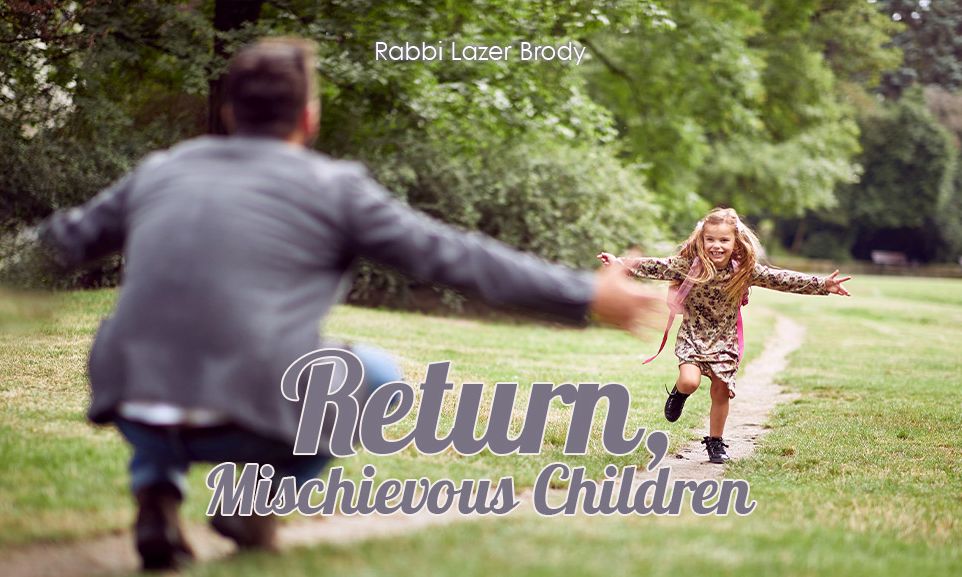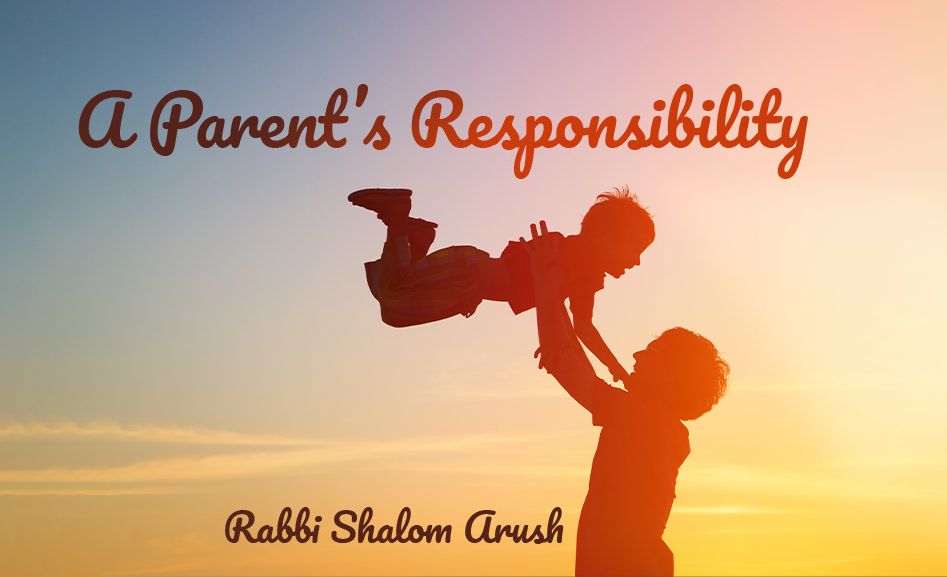
Return, Mischievous Children
Teshuva is a misunderstood concept. It not a social movement that applies only to those from non-observant backgrounds…

The prophet cries out to us in the Name of Hashem, “Return, mischievous children!” (Jeremiah 3:14). The word he uses for “mischievous” is shovevim, which is an acronym for Shemot, Va‘era, Bo, Beshalach, Yitro, Mishpatim. These are the names of the weekly Torah portion for the next six weeks. It is the six-week period that is a most opportune time to return to Hashem.
Do you know why people don’t return to Hashem? There are two reasons:
First, In the case of many who were born into observant families, they’ll say, “Why should I return to Hashem? I never left Him!” My esteemed and beloved teacher Rabbi Shalom Arush says that if a person never learned emuna, he or she was never with Hashem in the first place, no matter how religious their background might be.
The Hebrew word teshuva is usually translated as repentance, but it really means “returning”. As such, Jeremiah says to all of us shuvu banim shovevim (return, mischievous children). Hashem doesn’t merely want penitence; He wants us to come back to Him with all our hearts. Yet, many people view teshuva as an inferior social caste that’s applicable only to those who come from non-observant families, rather than a spiritual act and mitzvah of the Torah that obligates everyone.
The second reason why people don’t return to Hashem in sincere teshuva is that they simply don’t know  how. They think teshuva is some depressing act of self-flagellation that just brings them down. Nothing could be further from the truth.
how. They think teshuva is some depressing act of self-flagellation that just brings them down. Nothing could be further from the truth.
So, with the above in mind, let’s learn how to return to Hashem, in a pleasant, no-pain manner:
To do teshuva properly, with joy and not with sadness and self-persecution, a person must remember three important rules:
Rule 1 – You have an evil inclination that’s part of you, like it or not. A person becomes discouraged because his evil inclination overcomes him in some way, either with a bad habit or with lust of some sort. Many observant people don’t yet acknowledge that they have an evil inclination. They harbor the fantasy that they are expected to be, or capable of being totally good with no bad ever. That’s simply not correct. The evil inclination is a part of a person’s nature, just like any other of the body and soul components. Therefore, it’s no surprise that he or she has lust, negative character traits, and so forth that trip them up from time to time.
Rule 2 – Not only do you have an evil inclination, but you are incapable of overcoming it on your own! So what are you upset about? This is a law of creation, that the evil inclination is stronger than a person. Our sages say explicitly that every day, the evil inclination rises up to overcome a person, and if Hashem doesn’t help, one cannot prevail on his own.
Rule 3 – Be happy with your lot in life. Be happy with who and what you are right now. Sure, we all want to improve, but we can’t pop an “instant tzaddik” pill in a glass of water. It takes time, effort and spiritual elbow grease. Meanwhile, know that it’s not your job to be perfect. Hashem loves you the way are right now, so meanwhile, you can love yourself too. Once you do, you can strive to learn the laws of Torah and pray as much as you can.
Invest an hour of daily personal prayer, where you assess yourself in a calm and composed manner and repent for anything you might have done wrong in the last 24 hours since your previous personal prayer and self-assessment session. Ask Hashem to help you overcome your evil inclination. Don’t be disappointed in yourself when you repeat a wrongdoing. Simply share with Hashem what’s happening in your life and turn to Him sincerely in teshuva because He is always waiting for you with open arms, no matter what you’ve done wrong. Never give up your desires and never stop praying – the more the better – and you will certainly avoid sin. And, if you’re upset that you still commit sins, simply pray more and more and ask for Hashem’s assistance – there is no better advice.
Remember, Hashem wants you to be happy. Even if you did something terrible, He doesn’t want you to be down on yourself. Sadness and melancholy are worse than anything, for they sever a person from Hashem. That’s why Hashem wants us to return to Him, for when we do, we’ll really be happy, and that’s exactly what He wants.
Remember first that transgressions scar a person’s soul and inhibit the soul’s ability to absorb Divine illumination, just as scratches on glass inhibit it translucence. Teshuvah removes those scars of transgression and consequently facilitate the soul’s ability to absorb Divine illumination and consequently get closer to Hashem. In fact, the word “scar” helps us remember in an easy and practical way how to do teshuva, as follows:
S: Stop – this moment, stop whatever you’re doing that’s wrong and desire to make a change for the better;
C: Confess to Hashem what you did wrong; when a person confesses to Hashem, then the Heavenly Court can’t judge him. Hashem is merciful and forgiving, and especially compassionate to those who admit that they erred.
A: Apologize to Hashem for what you did; show Him that you realize your mistake. If you committed a transgression against your fellow human, you must apologize to him or her as well.
R: Resolve to do better in the future and ask Hashem to help you.
Bingo! The above four steps of S-C-A-R are all a person must do to completely fulfill the lofty mitzvah of teshuva. It’s really that easy! The Yetzer Hara, the arch liar who we know as the evil inclination, will do everything in his power to deter you from the path of teshuva. He’ll attack you with all kinds of lies; he’ll tell you that if you don’t grow a beard or change your appearance, you can’t do teshuva. Nothing could be further from the truth. And, you can a complete spiritual plastic surgery on yourself for free, and walk away being the most beautiful person around. Guaranteed!












1/07/2019
I have been trying to return
I only began at age 62. I'm 67 now. I think of all the wasted years. I was brought up very Reform. I was taught that G-d is a punishing G-d. I was never taught He loves me. I was brought up with very skewed ideas of Hashem. My current husband is not in the path with me which makes it very difficult. He says he's spiritual but doesn't like the idea of religion. His mother was Hewisg and father was not. So, he grew up with less than I did. He calls me a religious fanatic for dressing modestly and covering my hair and wearing long skirts. He lives in jeans and T-shirts. He puts in a kippah to go to Chabad for services although that's rare. He was diagnosed with bladder cancer, but he says he prays to his Higher Power. He's been sober 39 years through AA. That's his religion. So, I'm alone on my journey. FYI-my sister converted to Christianity 40 years ago. My nephew denies he's Jewish and even belonged to a fraternity in college that doesn't accept Jews! Only my son in Israel will continue Judaism and he's not religious, and he thinks I'm crazy, too. So, I'm alone on my journey.
1/07/2019
I only began at age 62. I'm 67 now. I think of all the wasted years. I was brought up very Reform. I was taught that G-d is a punishing G-d. I was never taught He loves me. I was brought up with very skewed ideas of Hashem. My current husband is not in the path with me which makes it very difficult. He says he's spiritual but doesn't like the idea of religion. His mother was Hewisg and father was not. So, he grew up with less than I did. He calls me a religious fanatic for dressing modestly and covering my hair and wearing long skirts. He lives in jeans and T-shirts. He puts in a kippah to go to Chabad for services although that's rare. He was diagnosed with bladder cancer, but he says he prays to his Higher Power. He's been sober 39 years through AA. That's his religion. So, I'm alone on my journey. FYI-my sister converted to Christianity 40 years ago. My nephew denies he's Jewish and even belonged to a fraternity in college that doesn't accept Jews! Only my son in Israel will continue Judaism and he's not religious, and he thinks I'm crazy, too. So, I'm alone on my journey.
1/07/2019
I don’t understand
What is shovevim, the acronym of "the six-week period that we are in the midst of, a most opportune time to return to Hashem"? I never heard of this before. Is it like Elul? And, what if I don't know what I did wrong to divorce a physically abusive husband that led me to lose custody of my son, my only child. I was in fear of my life. Growing up Reform, I knew nothing of laws of divorce or even that Hashem is good and loves me. For 36 years I've felt I've been punished for something having lost my only child when he was only 6 yo to his father. It's hard to think of a father loving me. My biological father doesn't love me. He only loves my sister and talks badly about me. My son's father beat me so badly I had to divorce and give up my ink child, my son, as "payment" to receive my Get. So the idea of a living Father is foreign to me. My mom and I were close. She died this past Tamuz. My current husband married me when he was 59 and was and never will be a father. So, how can I believe that Hashem loves me as a Father? As you read, I don't see fathers as loving. My biological father gives money to those he loves. He stopped giving me money. He's 91 yo. So, that relationship is nothing. He will die soon and I don't care. He doesn't love me. So, the idea of Hashem as a loving father is foreign concept. I'll just call Him G-d or Hashem. But, Father?